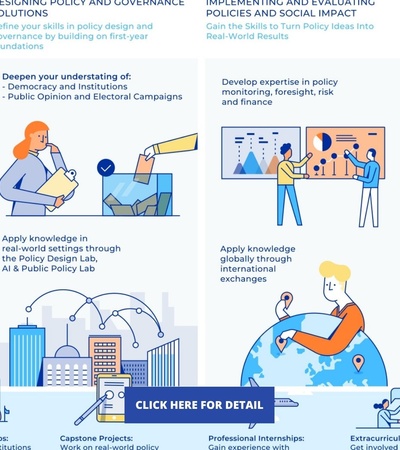Bachelor in Political Science
Bachelor in Political Science
Lead Global Change Through Policy Innovation
- Home
- Studies
- Undergraduate Degrees
- Bachelor In Political Science
A UNIQUE BACHELOR IN political science
A UNIQUE BACHELOR IN political science
The study plan for the Bachelor in Political Science at IE University is crafted to deliver a solid yet practical academic experience. It integrates expert knowledge from our esteemed faculty and strong connections with the professional world. This program is designed to equip ambitious individuals with the skills necessary to be the leaders of change our societies need.
Our hands-on teaching methodology perfectly balances theoretical studies and practical projects. Students engage with contemporary issues, applying their learning in dynamic scenarios that mirror actual policy environments.
This approach ensures that graduates develop adaptable profiles, ready to navigate and lead in the rapidly evolving geopolitical and social landscapes of the 21st century.
From specialized tracks to a thorough understanding of public administration fundamentals, students emerge from the Bachelor in Political Science ready to be influential leaders who drive positive change in the public and private sectors alike.

WANT TO KNOW MORE?
WANT TO KNOW MORE?
BACHELOR IN POLITICAL SCIENCE STUDY PLAN
BACHELOR IN POLITICAL SCIENCE STUDY PLAN
LEARN MORE ABOUT OUR BACHELOR IN POLITICAL SCIENCE
LEARN MORE ABOUT OUR BACHELOR IN POLITICAL SCIENCE
FIRST YEAR: SOCIAL CHALLENGES
In the first year of our Bachelor in Political Science, you will embark on a comprehensive journey to understand and tackle social issues. Foundational courses such as Microeconomics, Introduction to Political Science, Political Thought, Macroeconomics, Statistics, and Foundations of Governance and Public Administration will lay the essential groundwork. You will also acquire professional skills like policy writing and public speaking.
You will begin courses in public policy, exploring areas such as Ethics and Public Service, Science and Technology, and Health and Education. This year sets the stage for exploring the interplay between political thought, economic principles, technology, governance, data and policy-making. Practical experience will be gained through the Data Management Lab and the Policy Innovation Lab, allowing you to apply your knowledge.
SECOND YEAR: DESIGNING POLICY AND GOVERNANCE SOLUTIONS
Building on your first year's foundations, the second year focuses on refining methodological skills and knowledge for designing effective policy solutions. Courses such as Democracy and Institutions, Public Opinion and Electoral Campaigns will deepen your understanding of political science.
Practical application is facilitated in the Policy Design Lab and the Artificial Intelligence and Public Policy Lab. These courses provide practical tools to address a wide range of policy challenges, applying economic principles and strategic frameworks to real-world scenarios, and fostering a nuanced appreciation for governance complexities.
THIRD YEAR: IMPLEMENTING AND EVALUATING POLICIES AND SOCIAL IMPACT
Students will learn how to implement policies and to evaluate the impact of these policies.
To acquire these skills, you will study techniques to monitor and evaluate public policies, understand strategic foresight and political risk, and manage public finance. Additionally, you will develop professional skills in negotiation, management and human resources. Practical application, meanwhile, occurs in the Impact Assessment Lab.
With a wide array of academic exchange programs worldwide, you will immerse yourself in different cultural contexts and engage with diverse approaches to governance, gaining a practical understanding of global policy dynamics.
FOURTH YEAR: BECOME A SECTORAL POLICY EXPERT
In the fourth year of your Bachelor in Political Science program, you will specialize in specific policy areas through specialist tracks. You can choose from: Health, Education and Welfare; Energy, Climate and Environment or Science and Technology.
This final year is dedicated to deepening your expertise and practical skills in your chosen field. The curriculum includes a comprehensive, work-integrated learning program in a professional residency, featuring an internship and practical training in the particular expertise.
THE BACHELOR IN POLITICAL SCIENCE LEARNING JOURNEY
THE BACHELOR IN POLITICAL SCIENCE LEARNING JOURNEY
Your path to career success unveiled through our engaging infographic: Explore it to discover more about the program structure!
Bachelor in Political Science Tracks
Bachelor in Political Science Tracks
HEALTH AND EDUCATION
Health and Education Track
The Health and Education track delves into the intricacies of social policies and their impact on society. Students will explore the mechanisms behind education systems, global and public health or pandemics. In this track students also learn about welfare policies and social services. This track also covers critical issues such as migration, inequality and social justice, providing students with a comprehensive understanding of the challenges and opportunities in these areas.
is for individuals who are…
passionate about addressing social issues and interested in the policies that shape education, welfare and social services. If you have a keen interest in understanding and solving problems related to education, global health and pandemics, social inequality, migration, pension, taxes, education reforms and welfare systems, this track is for you.
looking for…
an opportunity to explore the policies that govern social services and education systems, and to understand how these policies can be designed and implemented to improve societal well-being. be designed and implemented to improve societal well-being.
to become...
- A professional in public or private companies
- A researcher in think tanks or academia
- A public relations or political consultant
- An advocate or NGO worker
- An education policy expert
- A leader in political institutions
ENERGY, CLIMATE AND ENVIRONMENT
ENERGY, CLIMATE AND ENVIRONMENT
The Energy, Climate and Environment track focuses on the intersection of energy policy, green transition and climate change. This track aims to equip students with the knowledge to develop and implement policies that promote sustainable energy solutions and address the global challenge of climate change. Students will master ESG concepts to work in the private or public sector, and learn about relevant policies on agriculture, water or food.
is for individuals who are…
interested in the energy sector and passionate about sustainable development. You will learn how energy policies can mitigate climate change and promote environmental sustainability.
looking for…
an opportunity to delve into complex energy production and consumption issues and their environmental impacts. You will explore the policies that drive the transition to renewable energy sources and sustainable practices.
to become...
- An expert in sustainability policy
- An environmental policy advisor
- An energy consultant
- A sustainability manager
- A climate change analyst
- A researcher in energy policy
SCIENCE AND TECHNOLOGY
SCIENCE AND TECHNOLOGY
Studying public policy for science and technology is essential because it bridges the gap between innovative advancements and societal needs, ensuring that scientific progress benefits all. It enables policymakers to understand and anticipate the impacts of technological developments, address ethical considerations and manage risks effectively. By studying public policy in this field, one can craft regulations that foster innovation while protecting public interests, promote sustainable and equitable technological growth, and ensure that the benefits of science and technology are accessible to diverse populations. For instance, cybersecurity, patents, data management, AI and other scientific advancements, and many other fields. This knowledge is crucial for creating informed, balanced policies that drive progress and improve quality of life.
is for individuals who are…
motivated to improve, passionate about bridging the gap between innovative advancements in science and technology and societal needs, and ensuring that scientific and technological progress benefits all.
looking for…
an opportunity to understand and anticipate the impacts of technological developments, address ethical considerations, and manage risks effectively, ensuring that the benefits of science and technology are accessible to diverse populations
to become...
- Policy analyst
- Regulatory affairs specialist
- Science and technology advisor
- Public affairs consultant
- Government relations manager
- Innovation policy consultant
- Research and development policy coordinator
- Technology policy analyst
- Legislative assistant
- Nonprofit sector policy director
- International policy advisor
- Data policy specialist
- Cybersecurity policy analyst
Learning a new language can open up a world of new opportunities
Learning a new language can open up a world of new opportunities
IE University considers multiple language acquisition to be a key element of its educational model, leading to success in both work and study.
The Language Center at IEU is proud to offer students the possibility to study a wide range of languages, including French, German, Portuguese, Chinese, Arabic, Spanish, and English. With such a large variety of options, our students are able to personalize their academic path to meet their future career plans and objectives.

The Language Center at IEU
The Language Center at IEU
The Language Center helps students develop their multilingual communicative skills to help them flourish in the international labor market.
COMPETENCES
COMPETENCES
GENERAL COMPETENCES
- Develop arguments that demonstrate a critical understanding of political and social phenomena.
- Apply the knowledge acquired to develop interpretations of current economic phenomena and argue the case.
- Make use of historical and current documentary sources.
- Develop the technical IT competences necessary for a professional setting.
- Present a global vision with regards to trends and debates in international relations.
- Evaluate the economic dimension of international public and private policies.
- Plan and implement public and private policies at the international level, providing justification for their implementation.
- Use different information sources and channels to create and convey information, ideas, problems and solutions related to current international affairs.
- Train to conduct research and studies on the international sphere and its political, economic, social and cultural facets.
- Possess a critical understanding of the legal implications of international relations.
- Develop public- and private-sector strategies for real economic contexts.
- Communicate orally and in writing in both Spanish and English in a professional and academic context.
- Analyze and consider contemporary challenges and the social and cultural complexity of globalized society through a critical and creative lens.
- Apply suitable ethics-based judgements to all professional activities and relationships, with the ability to differentiate between personal and professional life.
- Apply and adapt knowledge and competences to a variety of international academic and professional contexts.
- Develop flexible problem-solving tools for organizational management that take the satisfaction of different stakeholders into consideration.
PROGRAM-SPECIFIC COMPETENCES
- Understand classical and contemporary political theories.
- Analyze and compare the structure and functioning of the main political systems.
- Recognize the paradigms, concepts and principles of political science.
- Understand microeconomic and macroeconomic models and obtain specific information from them.
- Be capable of identifying the key aspects of an economy and the operation of local and global markets.
- Understand international relations’ evolution as a discipline by placing it in the corresponding political, economic, legal and social contexts.
- Understand the historical dimension and evolution of the political and social processes hitherto in play in international relations.
- Produce, gather, analyze and interpret data and statistics.
- Understand the concepts, framework of application and theoretical foundations of international relations.
- Justify political and social stances in line with the discipline’s different theories.
- Understand the relationships between the different stakeholders in play as a function of a region’s current economic policy model.
- Understand the legal aspects and decision-making processes used as a part of nations and international organizations’ foreign policies in accordance with international law.
- Evaluate cases related to international jurisdiction, applicable law and the recognition and enforcement of judgements.
- Understand the structure, organization and operation of different types of international and supranational institutions, with particular focus on the European Union and the challenges it will face in the future.
- Analyze the course of global issues such as international terrorism, challenges in health and education and development cooperation.
- Understand and analyze the international economic environment and the economic dimension of international institutions using economic and financial tools in line with a given policy direction.
- Analytically connect past and current knowledge and processes through interdisciplinary analysis.
- Design communication strategies and apply political communication techniques.
- Apply the knowledge acquired to experimentation and the generation of new knowledge. Integrate and deploy all knowledge acquired throughout the program.
TRANSVERSAL COMPETENCES
- Identify the main cultural identity traits that characterize today’s world by understanding the main contemporary ideological trends.
- Behave professionally in accordance with the core principles and ethics of the profession.
- Manage unforeseen situations by being able to adapt to organizational changes.
- Use knowledge of the discipline to analyze and evaluate current situations.
- Form a part of interdisciplinary and multicultural teams to achieve shared goals in a diverse environment.
- Work actively in an international context.
APPLICABLE REGULATIONS OF THE PROGRAM
APPLICABLE REGULATIONS OF THE PROGRAM
FREQUENTLY ASKED QUESTIONS
FREQUENTLY ASKED QUESTIONS
Which field of political science is best?
Fields such as international relations and public policy are considered highly rewarding within political science.
What is the best major to pair with political science?
Business Administration, Economics, Law, or International Relations are excellent majors to pair with a political science degree for a comprehensive understanding of global and domestic issues.
What subjects are in a political science degree?
A political science degree typically includes subjects such as political theory, comparative politics, international relations, public policy, and research methods.
How hard is a bachelor in political science?
A bachelor's degree in political science can be challenging due to its focus on critical analysis, research skills, and understanding complex political systems and theories.







